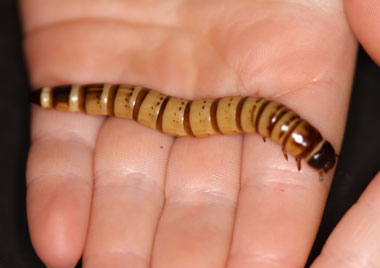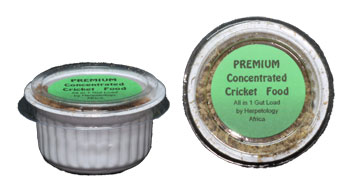
Superworms are easy to maintain and can be kept in just about any plastic container; although 20-50 litres is ideal for larger volumes – make sure the sides are smooth to prevent them climbing out. When keeping large numbers together, preferably place them in a thick layer of bran and stack the egg boxes to increase the usable surface area as the worms like their own crawling space.
Superworms also do not morph without the application of very specific conditions so they can be kept for lengthy periods without the problem of changes in their status into nymphs or beetles, making them unusable.
Keep your superworms in a well ventilated area out of direct sunlight because temperature extremes can be fatal. Should the temperatures drop substantially at night or in winter, use a heat pad, or cover them with a blanket or towel to retain heat – ensure enough oxygen though. Keep the temperature to between 24C to 28C for optimal conditions. Do not spray or dust insect repellent near your superworms, nor expose them to poisonous or toxic fumes as they will die.
Clean out containers regularly of worm excrement and old food as well as any dead worms, as the decomposition process generates ammonia which is toxic to the worms and they will quickly die. Ensure any smelly bran is replaced and the environment is kept dry and hygienic.
Superworms are scavengers by nature and will eat just about anything. We suggest using fruit and veggies (such as butternut, gem, carrot or similar) as their moisture supplement and ensure there is always enough available. We strongly suggest using our PREMIUM GUT LOAD FOOD as a dry food source while they are in your care as it is specially formulated to cater to all their gut loading needs. You may also wish to powder the food with additional calcium to ensure they and your animal have the best possible nutrition.
Bear in mind that what you feed to the superworms is what will pass on to your animals…
Keep your superworms in a well ventilated area out of direct sunlight because temperature extremes can be fatal. Should the temperatures drop substantially at night or in winter, use a heat pad, or cover them with a blanket or towel to retain heat – ensure enough oxygen though. Keep the temperature to between 24C to 28C for optimal conditions. Do not spray or dust insect repellent near your superworms, nor expose them to poisonous or toxic fumes as they will die.
Clean out containers regularly of worm excrement and old food as well as any dead worms, as the decomposition process generates ammonia which is toxic to the worms and they will quickly die. Ensure any smelly bran is replaced and the environment is kept dry and hygienic.
Superworms are scavengers by nature and will eat just about anything. We suggest using fruit and veggies (such as butternut, gem, carrot or similar) as their moisture supplement and ensure there is always enough available. We strongly suggest using our PREMIUM GUT LOAD FOOD as a dry food source while they are in your care as it is specially formulated to cater to all their gut loading needs. You may also wish to powder the food with additional calcium to ensure they and your animal have the best possible nutrition.
Bear in mind that what you feed to the superworms is what will pass on to your animals…

